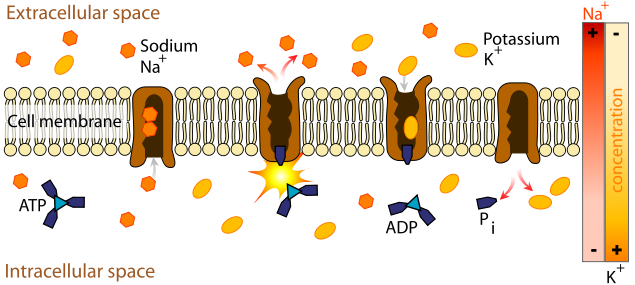Since your nerves can also no longer. Its essential for basic functions of the body and low levels can take a toll on both your brain and heart.
 What Does Potassium Do For The Body
What Does Potassium Do For The Body
Potassium can reduce fluid retention in the body by increasing urine production.

How does potassium help the body. Whats more a high-potassium diet may help reduce blood pressure and water retention protect against stroke and prevent osteoporosis and kidney stones. If you have too little potassium in your body you might notice abnormal nerve function that affects your sense of touch and muscle control. 1- It decreases the sodiums negative effects in the body plus help kidneys to remove extra sodium through urine.
You might notice numbness and tingling. It helps the body manage fluids send nerve signals and regulate muscle contractions. And keeping calcium around helps to keep bones strong.
Your nerves need small amounts of potassium to function since potassium along with sodium helps your nerves send the electrical signals required for nervous system function. See also Overview of Electrolytes Most of the bodys potassium is located inside the cells. It also helps to control the amount of water in your body and maintain a healthy.
By Andrea Boldt Low levels of potassium can cause feelings of weakness muscle spasms or irregular heartbeat. There are two ways that this mineral can aid in lowering blood pressure. Potassium is largely found in the cells of our body.
Potassium is an electrolyte that the body needs to stay healthy. As an electrolyte potassium is vital to the healthy functioning of all of your bodys cells tissues and organs. It helps the body regulate fluid send nerve signals and regulate muscle contractions.
98 of the potassium in the body is inside the cells. Potassium is the third most abundant mineral in the body 5. Regulates water balance One of potassiums biggest roles in our bodies is to regulate the amount of sodium entering and exiting our cells thereby controlling the amount of fluid we retain or excrete.
2- It assists in easing tension in the blood vessel walls thus further lowering blood pressure. Potassium referred to as one of the electrolytes is used to regulate fluid balance and for stimulating the kidneys to remove waste products. Roughly 98 of the potassium in your body is.
Potassium-sparing diuretics can rid the body of excess sodium. This will help normalize electrolyte levels. This maintains the bodys pH levels which ensures that.
Potassium is one of the bodys electrolytes which are minerals that carry an electric charge when dissolved in body fluids such as blood. As the American Heart Association AHA note foods that contain potassium can help manage blood pressure by. To help absorption raise your.
Potassium is a mineral that you dont want to run low on for any stretch of time. Potassium helps of lower calcium levels in the urine. During exercise potassium helps our blood vessels to widen during exercise.
Prevention of Kidney Stones. As an electrolyte potassium is vital to the healthy functioning of all of your bodys cells tissues and organs. Potassium is one of the most important minerals in the body.
Here are the top ten benefits of potassium so you can make sure youre getting enough each. Your doctor will tell you if you have clinically low levels after running a simple blood test. What Helps a Body Absorb Potassium.
Potassium does this by cutting down on how much calcium leaves your body in your urine. It helps regulate fluid balance muscle contractions and nerve signals. Together with sodium it triggers nerve impulses and assists with heart functioning blood pressure and fluid balance.
So how does potassium help lower blood pressure. As you lose electrolytes in your sweat you should always obtain a source of these important minerals during or after a bout of intense physical activity. But some diuretics and potassium supplements can be.
Potassium reduces the elimination of excess calcium in the body. It also helps to control the amount of water in your body and maintain a healthy blood pH level. Not only does that help with circulation but dissipates heat generated during exercise.
Potassium is necessary for the normal functioning of all cells. 80 of this is in muscle cells and 20 is in bones liver and blood cells. Reduction of fluid Retention.
Potassium is the third most common mineral in our body. Unmanaged high blood pressure can result in heart. Potassium levels may also temporarily become lower after a sweaty workout or after a bout of diarrhea and vomiting.
Potassium is necessary for. It regulates the heartbeat ensures proper function of the muscles and nerves and is vital for.






:max_bytes(150000):strip_icc()/what-causes-early-morning-awakenings-3014946-5bb7bf5746e0fb00269208af.png)


